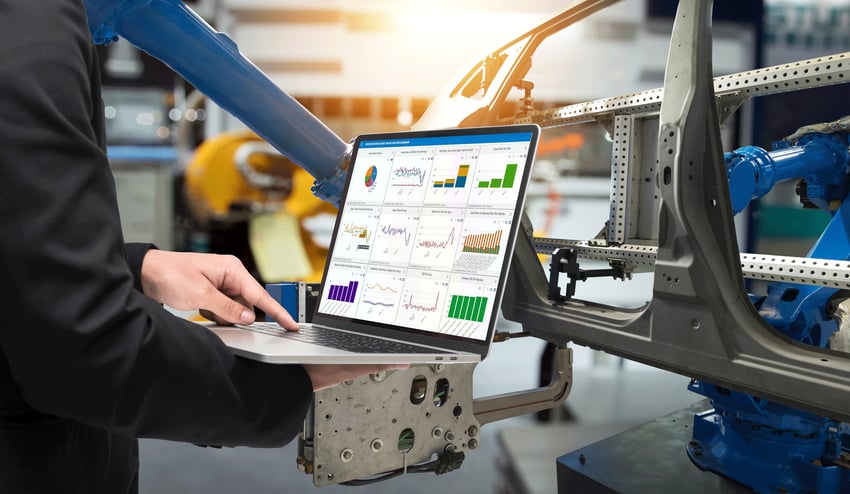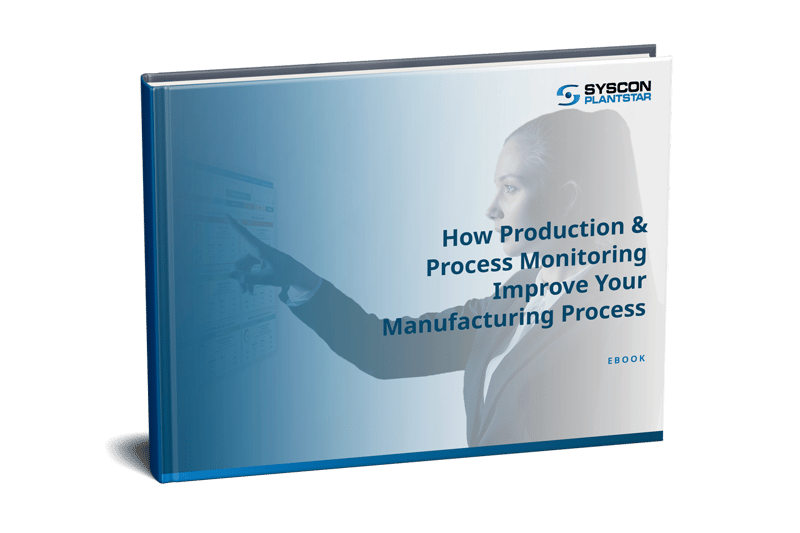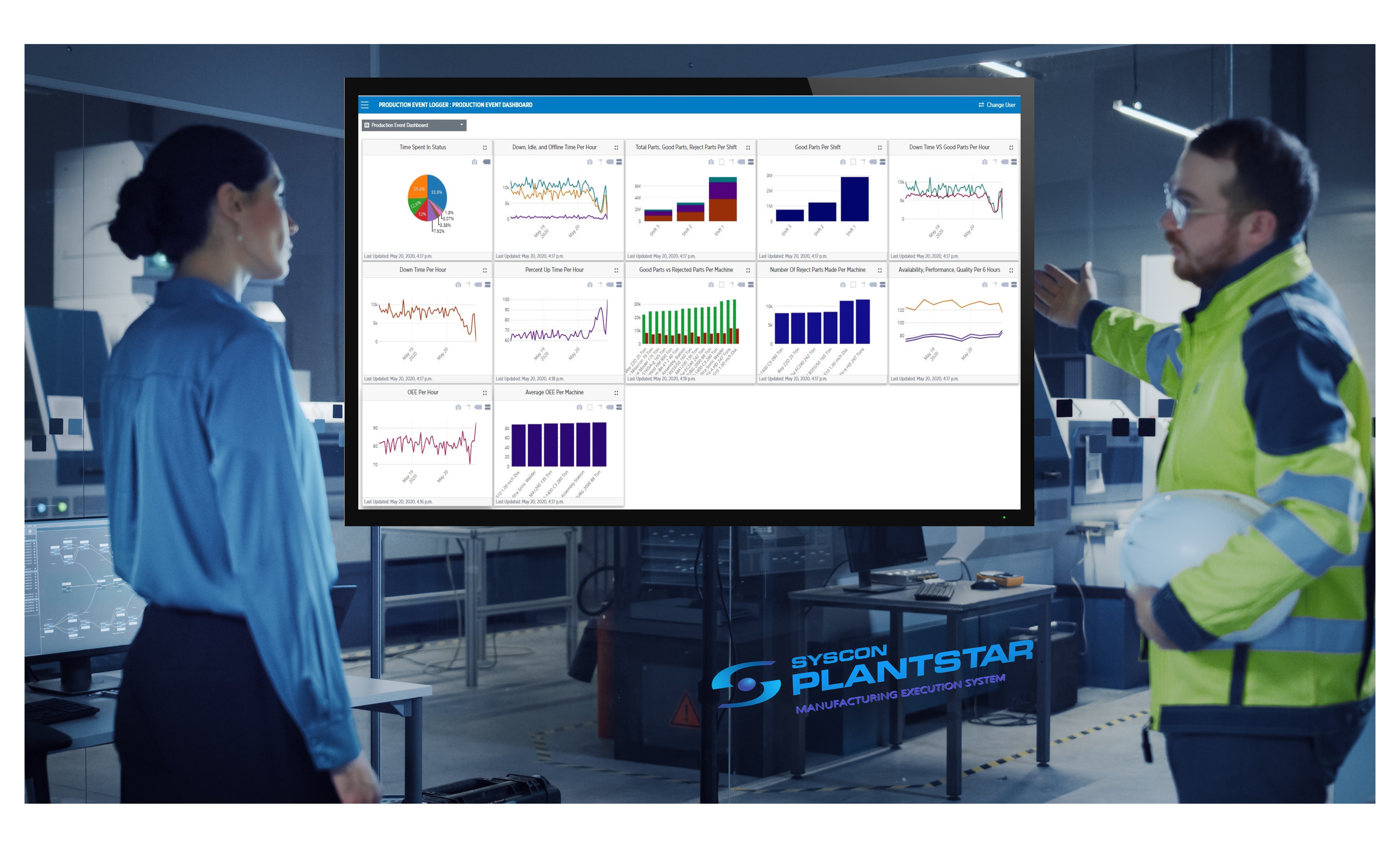PlantStar BLOG
8 Benefits of a Cloud-Based Manufacturing Execution System
Nov 24, 2021 5:00:00 PM / by PlantStar Team

The manufacturing industry is a highly competitive market segment. In fact, just about every US manufacturer (99%) feels pressure to get their products to market now faster than ever before. Deploying a cloud Manufacturing Execution System (MES) solution provides them with the technical agility needed to thrive in this environment.
Currently, most of the information about manufacturing operations is stored in data silos, applications that do not share information with other systems. In fact, 70% percent of data collected in production systems never leaves the factory floor, according to Gartner Inc.
A MES solution bridges that gap by acting as the middle layer between process control systems and Enterprise Resource Planning applications. With it, data collection occurs in a more cohesive fashion, which results in numerous plant process improvements. Businesses have two options to deploy MES software: a legacy system running on their premises or a cloud solution, managed by a third party. The latter offers them many potential benefits.
1. Eliminate Upfront Costs
Typically, a legacy system requires an oftentimes daunting initial capital investment, ranging from tens of thousands to millions of dollars depending on the size of the company. The expenditures arise because the customer purchases all of the computer infrastructure (server, network equipment, storage solutions, software) needed to run the application. Cloud avoids such investments. Instead, the enterprise pays a set monthly fee that typically is based on how many licenses they require and how much they use the system each month.
2. Avoid Ongoing System Maintenance
After installing an MES system, the customer’s technology team becomes responsible for system maintenance, such as system monitoring; troubleshooting and fixing; and installing enhancements. Given today’s dynamic manufacturing market, they must allocate a great deal of time, money, and personnel to keep the system operating at peak efficiency. With cloud, the vendor maintains the system.
3. Concentrate on Business Differentiation
Manufacturing workers have to keep many balls in the air, developing products, monitoring the production process, servicing customers, ensuring the supply chain flows smoothly, and with a premises-based system keeping the computer system running. Moving to the cloud removes the last item from their to-do list, so they allocate more resources to the others, which represent their core business.
4. Improve System Scalability
System requirements change rapidly nowadays. Scalability is a problem because hardware’s physical constraints limit how much processing power it delivers. At certain points, a new system is needed, and time consuming, costly upgrades must be made. With cloud, vendors deploy large server farms, so adding more resources requires just a few clicks rather than the traditional manually intensive forklift upgrade. If demand shifts because of an event, like the pandemic, your organization gracefully adjusts to it.
5. Enhance System Security
Your technology systems are under attack – constantly. In 2021, cybercrime is expected to inflict $6 trillion in damages globally, according to market research firm Cybersecurity Ventures. Keeping up with today’s increasingly sophisticated threats requires a laser focus as well as resources dedicated solely to that task. You have many other issues to worry about; cloud suppliers do not. Consequently, they have developed state-of-the-art security solutions that keep the bad guys away from your sensitive information.
6. Boost Quality
Quality helps suppliers improve production run yields. With a cloud MES, factory workers gain real-time data on items, like parts rejected. They are able to act on the information and stop a process quickly when needed and in certain cases create workarounds that prevent the impending problems from occurring.
7. More Collaboration
The pandemic created a manufacturing labor shortage. Supply chains have been strewn with snafus MES software offers help solve. By connecting machines and building smart factories, plant floor dynamics change. Machine-to-machine communications occurs, and systems are integrated. The availability of real time data drives proactive collaboration among producers, suppliers, and other stakeholders along the value chain.
8. Address Personnel Shortages
The pandemic exacerbated personnel shortfalls. Cloud MES solutions feature next-generation features, such as instant real time alerts. They notify staff to know what is happening from the start of the supply chain down to product delivery. Instant alerts generate immediate email, text, and voice alerts concerning the status of any plant floor machine. They no longer fumble through reams of paper or complex spreadsheets. In addition, with the information, manufacturers automate routine functions. Consequently, they boost employee productivity, do more with less; and ameliorate the labor shortage.
Manufacturing companies are under intense pressure. A cloud MES system puts them on the path to modern, Industry 4.0 factory. Not only do they break down traditional data silos, but they also ease deployment, reduce maintenance, increase quality, and enhance their competitive position.

Featured E-Book
Discover the revolution that awaits your manufacturing process and step into the world of smart factories! Don't miss out on the opportunity to elevate your business to new heights. Download our featured ebook, "How Production and Process Monitoring Improve Your Manufacturing Process," and unlock the potential of a Manufacturing Execution System (MES) to break down barriers, automate processes, and streamline your operations. Learn how to harness the power of intelligent equipment, IoT, Big Data, and AI to continually improve your operations, decrease machine downtime, reduce paperwork, and lower labor costs. Embrace the future of manufacturing and build a smart factory today! Click here to get your copy now and start transforming your business.
Topics: mes solutions
Subscribe to Email Updates
Posts by Topic
- Manufacturing Execution Systems (38)
- manufacturing solutions (16)
- MES 101 (13)
- Industry 4.0 (11)
- improve efficiency (10)
- Plastic Molding (9)
- Plastics Technology (9)
- mes software (9)
- mes solutions (9)
- MES hardware (8)
- Shop Floor Production (8)
- digital transformation (7)
- Reduce scrap (6)
- data-driven-decisions (6)
- Medical molding (5)
- lean manufacturing (5)
- process monitoring (5)
- product quality (5)
- lights-out manufacturing (4)
- manufacturing dashboard (4)
- production monitoring (4)
- ERP integration (3)
- Shop Floor Safety (3)
- supply chain management (3)
- Injection Molding Technology (2)
- defect collection (2)
- machine mes (2)
- process variables (2)
- digital strategy (1)
- labor gap (1)
- throughput (1)


